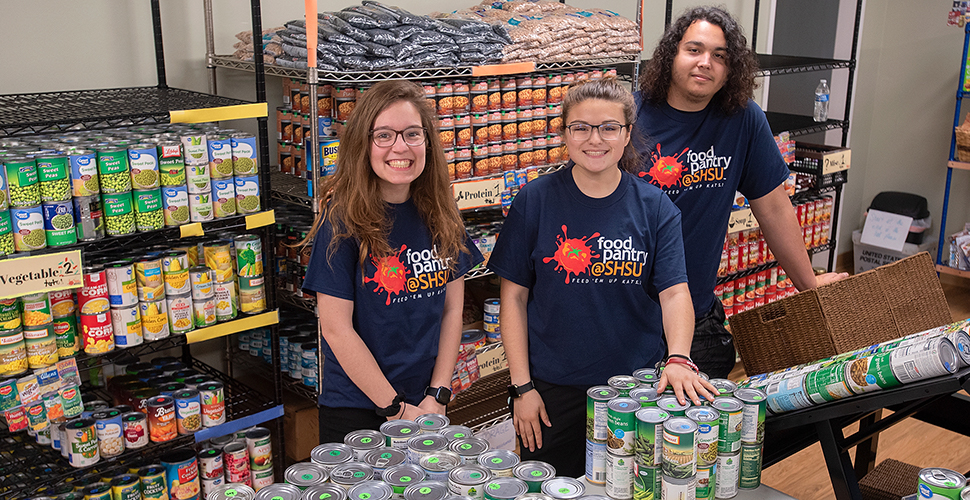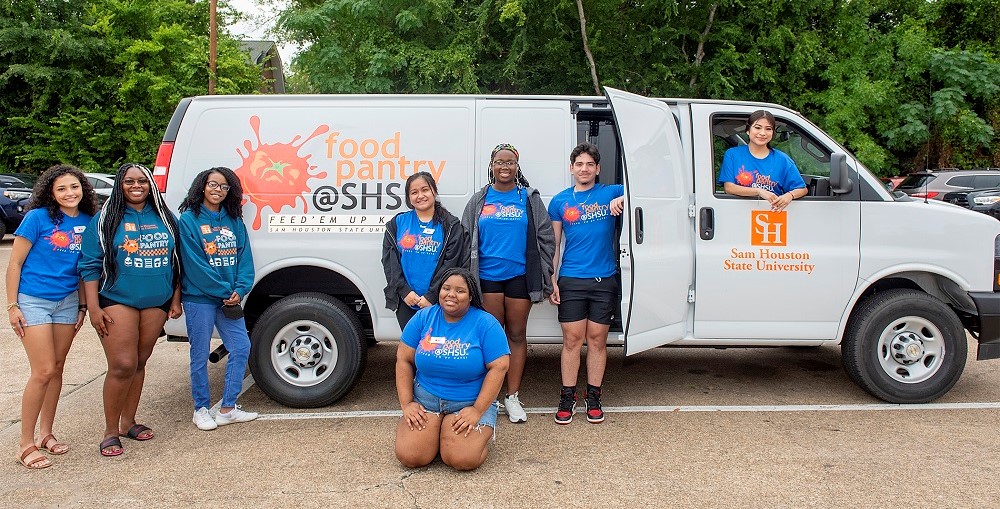Food Pantry @ SHSU

Our MIssion
The Mission of the Sam Houston State University Food Pantry (SHSU-FP) is to support Sam Houston State University (SHSU) students who experience food insecurity, to encourage an educational understanding of food insecurity, and to provide a space for students to volunteer and network with their peers. Currently, the Food Pantry is under the direction of Dr. Kathleen Gilbert and operated by work-study students, Dietetic Interns, and volunteers from the Food Pantry SHSU student organization.

Shop the Pantry
How to Shop at the SHSU Food Pantry
1. Visit https://app.pantrysoft.com/login/shsu.
2. Start by completing the registration form.
3. Once registered, you can log in, browse the available inventory, and select the items you need.
4. When your order is complete, choose a convenient pickup date and time at the SHSU Food Pantry, located at 1108 17th Street, SHSU Main Campus.
If you need assistance or have any questions, contact us at foodpantry@shsu.edu or 936-294-4441.
Support the Pantry
Help Fight Hunger on Campus – Donate to the Food Pantry Today!
Every donation makes a difference. Your support helps provide nutritious food and essential items to the Bearkat Community facing food insecurity. Together, we can ensure no one has to choose between their education and their next meal.
-
Bring Items in Store
Call us at 936-294-4441 to check availability and set a drop off appointment.
Food Pantry Wish List
→Grains
→Proteins
→Canned fruit
→Condiments
→Canned soups -
Give
Give Online
Make a one-time or recurring donation via our secure portal.By Phone
Call our University Advancement team at 936.294.3625.By Mail
Send your check, payable to Sam Houston State University, to:
Division of University Advancement
Sam Houston State University
Box 2537
Huntsville, TX 77341-2537 -
Volunteer
Volunteering with the SHSU Food Pantry is an excellent way to serve your SHSU community. Please email us at foodpantry@shsu.edu for opportunities.
Swipe out Hunger
Need meal help? Check your eligibility for free meals at campus markets by filling out the survey below.
Food Pantry Policies
The purpose of this Food and Nutrition Policy is to guide the commitment of the SHSU-FP to provide healthful foods, nutrition education, and health promotion to the SHSU student body. Our nutrition policy communicates to students, affiliated pantries and other agencies, donors, government programs and the community at large that we are committed to providing healthful foods to SHSU students.
The SHSU-FP has served the SHSU student body and the community for several years. In recent years, the food pantry has become aware of the increasing rates of obesity and its associated co-morbidities during emerging adulthood.1,2 SHSU-FP is firmly committed to providing healthful foods to students to help prevent these diet-related conditions.
In a strategic effort to improve the quality of the food made available to students and provide health promotion, we have recently strengthened our partnerships with the Houston Food Bank (HFB) and the American Heart Association (AHA).
We want our student body to know that their health concerns, food, and cultural preferences are among our highest considerations in acquiring more healthful food. We recognize the challenges associated with the cost of nutritious food items, the ability to access wholesome, local foods, and the many other considerations affecting what students want and need.
We recognize the increasing role of the SHSU-FP in providing healthful foods to the student body. Our policy to procure and distribute foods of high nutritional quality demonstrates to the student body and the University that we take our role and responsibility seriously.
The SHSU-FB policy applies to all foods acquired by the food bank, including foods and beverages donated by food manufacturers, distributors, retailers, organizations, producers/growers, and community members, foods and beverages obtained from government programs, and foods and beverages purchased by the food bank.
This policy centers on the Dietary Guidelines for Americans, the Healthy Eating Research (HER) Nutrition Guidelines for the Charitable Food System3, and client-food preference research. In accordance with this nutrition policy, we aim to actively seek, procure and distribute the following foods when appropriate and possible:
Table 1: Healthy Eating Research Nutrition Guidelines for the Charitable Food System3, examples of Choose Often foods that will be prioritized at SHSU Food Pantry.
|
Fruit and Vegetables |
Fresh, frozen and canned fruits and vegetables with no added sugar or sodium; low sodium vegetables; fruit canned in 100% juice or in water |
|
Grains |
Whole grains (quinoa, brown rice, barley); whole wheat pasta; whole grain breads; whole grain cereal with ≤6 grams added sugar; plain oatmeal |
|
Protein |
Dried beans; low-sodium canned beans; some nut butters; nuts; fresh poultry; fish; eggs; tofu; low-sodium canned tuna; canned salmon |
|
Dairy |
Fat-free or low-fat unsweetened yogurt; skim, 1% and 2% milk; fat- free and reduced fat cheeses; light sour cream |
|
Non-Dairy Alternatives |
Unsweetened almond, rice, cashew, oat and pea milk; unsweetened soy, almond, rice, cashew and oat milk yogurts; some plain non-dairy alternative products with ≤ 6 g of added sugar |
|
Beverages |
Plain water; flavored and unflavored sparkling water; plain coffee; unsweetened tea |
Healthful Foods to Prioritize in This Policy
Food pantry research clearly indicates that the people served prefer receiving healthful foods—particularly fresh fruits and vegetables. Although our policy aims to increase all of the “Choose Often” foods outlined in the HER Nutrition Guidelines, we will put considerable effort and emphasis initially on procuring more fresh fruits and vegetables, particularly those that are more colorful, nutrient-dense varieties.
Foods to Deprioritize at SHSU Food Pantry
The HER Nutrition Guidelines recommend “Choose Rarely” foods and beverages that contribute mainly saturated fat, sodium and added sugar. Such foods tend to be high in calories and low in nutrients. This nutrition policy aims to deprioritize the procurement and distribution by food banks of the “Choose Rarely” foods and beverages as outlined in the HER Nutrition Guidelines. When appropriate and possible, we will not actively seek or procure foods in this category and will work toward reducing our inventory of these types of items:
Table 2: Healthy Eating Research Nutrition Guidelines for the Charitable Food System3, examples of Choose Rarely foods that will be deprioritized at SHSU Food Pantry.
|
Processed/packaged snacks |
Chips (corn, potato, puffed cheese, tortilla; not including lower/reduced fat or baked), Crackers (not including lower/reduced fat or baked), French fries, Onion rings, Pork rinds, Bars (including granola, cereal, energy, snack bars)
|
|
Desserts |
Cakes, Candy, Chocolate, Cookies, Donuts, Frozen desserts, Ice cream, Fruit snacks, Muffins, Pastries, Pies, Popsicles, Pudding |
|
Sugar-sweetened beverages |
Energy drinks (Full Throttle Energy Drink®, Monster Energy Drink®, Mountain Dew AMP Energy Drink®, Red Bull Energy Drinks, Rockstar Energy Drink®), Fruit drinks (coconut water with caloric sweetener, fruit-flavored drink or water with caloric sweetener, fruit nectars, fruit punch, fruit smoothies with caloric sweetener), Sodas (regular soft drinks (not including diet), sugar cane beverage, sugar-sweetened carbonated water), Sports drinks (Gatorade Sports Drinks®, Powerade Sports Drink®), Sweetened coffees (blended iced coffee drinks, café mocha, presweetened powdered coffee mix, pre-sweetened ready-to-drink coffee), Sweetened teas (pre-sweetened ready-to-drink tea, pre-sweetened tea mix). Sweetened shakes and smoothies (ready-to-drink milkshakes, Eggnog, Vitamin-enhanced waters)
|
Our priority will be to shift purchasing resources towards cooking staples, items on the “Choose Often” list of the HER guidelines, and other dry international goods. We will avoid purchasing “Choose Rarely” foods with high added sugar content, such as soda and candy.
Our overall nutrition commitment to our student body is that 85% of all food orders, purchases and targeted donations will be nutritionally dense foods.
This policy will take effect on 9/1/2023 at which time it will become part of the Food Pantry’s organizational policies and procedures. The Director of the Food Pantry is responsible for an annual review of this policy with staff in order to keep it up to date with community needs. All new staff and volunteers will be provided an orientation to the policy by either the Director or a Manager.
Contact Us
Visit
Food Pantry @ SHSU is located at 1108 17th Street, Huntsville, TX.
Hours of Operation: Monday -Thursday 9 am - 5 pm